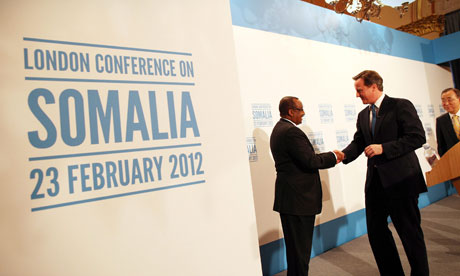The popular adage “There’s no such thing as a free lunch” kept crossing my mind in the run-up to the just concluded London Conference on Somalia. I wondered why a gathering focusing on a Sub Saharan African country was to be hosted by the UK government in London, the Foreign and Commonwealth Office to be precise. I thought of keeping my musings to myself until I found that a number of people shared the same sentiments, especially my Kenyan friend Kenneth Ochieng who summed up these sentiments in an article posted on this site
Such a global gathering to discuss the way forward out of the litany of problems plaguing Somalia, referred to by policy makers and development experts as the archetypal “failed state” is certainly a commendable and progressive step. This is especially because Somalia’s problems of collapsed state institutions, Al-Shabab terrorism, piracy and humanitarian crisis affect not just Somalia but neighbouring countries such as Kenya and Ethiopia, and successfully tackling these problems requires a concerted transnational effort with the relevant stakeholders.
However, my grouse here is why this gathering heavily attended by many African Heads of States, African multilateral organizations and other world leaders was hosted by British Prime Minister David Cameron in London? Understandably, the safety of dignitaries couldn’t be compromised by holding it in Somalia, thus I wondered why the confab couldn’t be hosted neither by Jonathan in Abuja or Attah Mills in Accra; or Kibaki in Nairobi in the Horn of Africa within the vicinity of Somalia itself, or Zuma in Johannesburg. The conference couldn’t convene in the brand new glitzy African Union Headquarters literally built from scratch and furnished by Chinese funds and labour. One could perhaps assume that a conference on the Nigerian Boko Haram insurgency group (probably the next biggest security threat in the region), would be held in some swanky conference hall in Washington D.C., New York, Berlin or Paris.
I simply wonder when African leaders would grow up, be more assertive in handling African affairs and wean themselves off international help over every thing (apparently including having our regional headquarters built for free or confabs on African security held in far away European capitals). Yet at the slightest opportunity, when it suits our African leaders, they utter populist “pan-African” rhetoric about being “dictated-to” and constrained by “imperialist” Western nations. I wonder when we are ever going to grasp the dynamics of international politics and realize that nations hardly do things for others involving massive funds on the basis of pure altruism but mainly based on what would benefit them. When would we start put our own national interests on the front burner before taking any step, in this case seizing the opportunity of such an international gathering to showcase our beautiful capital cities and improve outsiders’ perceptions of Africa for instance, and cut costs associated with funding such international travels?
With the conference over and a laudable communiqué released which inspires some hope on the future of security in Somalia, I hope our African leaders would subsequently consider being more assertive in holding such gatherings in an African country — even though the follow-up conference in June 2012 is billed to take place in Istanbul, Turkey. For one it would show our seriousness in taking charge of our destiny like other developing regions are doing and not painting the image of a helpless, dependent continent. For another it would boost the profile of the city holding such a gathering especially in the international media, and also bring in some foreign revenue to the local economy from hosting and accommodating delegates.
Zainab Usman is a Nigerian. She writes from the United Kingdom and blogs at www.zainabusman.wordpress.com



